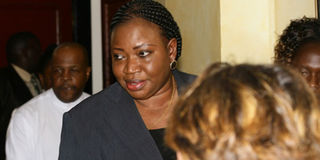ICC: Bensouda loses bid to strengthen charges against Ruto

International Criminal Court Prosecutor Fatou Bensouda arrives at the Serena Hotel, Nairobi October 25, 2012 for a news conference. A bid by Ms Bensouda to strengthen her case against Deputy President William Ruto and journalist Joshua arap Sang suffered a blow on Saturday. Photo/File
What you need to know:
- Ms Bensouda had sought the chambers permission to extend the scope of the crimes against the deputy President and Mr Sang in Eldoret to prove that crimes in the greater Eldoret area began on or about 30 December 2007.
- Ekaterina Trendafilova, sitting as a single judge ruled that allowing such an amendment in the absence of any justification would be an ‘unfair burden’ to the defence, which would require time to conduct its investigations ahead of their trial scheduled to commence on September 10.
- However, Judge Trendafilova said a brief review of the procedural history of the two cases arising from the Kenya situation reveals lack of efficiency and due diligence on the part of the Prosecutor in handling the said request.
A bid by the International Criminal Court Prosecutor Fatou Bensouda to strengthen her case against Deputy President William Ruto and journalist Joshua arap Sang suffered a blow on Saturday.
This is after the Pre Trial Chamber II rejected her request to amend charges against the duo to include crimes that were allegedly committed in Eldoret between December 30 and 31, 2007.
Ekaterina Trendafilova, sitting as a single judge ruled that allowing such an amendment in the absence of any justification would be an ‘unfair burden’ to the defence, which would require time to conduct its investigations ahead of their trial scheduled to commence on September 10.
“This course of action would unduly compromise the rights of the accused persons to be informed promptly of the nature, cause and content of the charges, to have adequate time and facilities for the preparation of their defence and to be tried without undue delay,” she ruled.
“In light of the foregoing, the single judge cannot but reject the Prosecutor's request.”
Ms Bensouda had sought the chambers permission to extend the scope of the crimes against the deputy President and Mr Sang in Eldoret to prove that crimes in the greater Eldoret area began on or about 30 December 2007.
The Prosecutor argued that she had since the confirmation of charges, obtained evidence from twelve witnesses who allege that crimes were committed in the greater Eldoret area - namely in Kimumu, Langas, Yamumbi and Huruma areas - "soon after the announcement of the presidential election results on 30 December 2007"
According to the Prosecutor, the Defence has been provided with the statements of these twelve witnesses between 30 November 2012 and 9 January 2013 and that rejecting her request would cause monumental prejudice to her case.
However, the defence teams for Mr Ruto and Mr Sang called for the rejection of the Prosecutors’ request as it will be prejudicial to their rights to a free and expeditious proceedings and adequate time to prepare their defence.
Mr Rutos defence team said the proposed amendment was far from insignificant, as contended by the Prosecutor, because it would extend the temporal scope of the charges by 50 per cent.
They argued that granting the request would impel the Defence from being ready to effectively represent Mr. Ruto given the upcoming commencement of the trial as currently set.
“Further, this would require additional time to conduct Defence investigation, thus negatively impacting on Mr Ruto's right to expeditious proceedings, as enshrined in article 67(l)(c) of the Statute,” Ruto’s lawyers argued.
Lawyers representing Mr Sang on the other hand said the incidents mentioned in the newly collected evidence of the Prosecutor would need to be analysed and investigated prior to the trial.
Thursday, Judge Trendafilova said if rejecting her request would cause monumental prejudice to her case, the Prosecutor should have “seized’ the Chamber much earlier, at a minimum when she learned about the new date for the start of the actual trial and not only few weeks before its commencement.
She said one cannot assume that the defence was in a fair position to prepare its case on the basis of facts and charges related to particular dates which were explicitly rejected by the Pre Trial Chamber in their confirmation of charges decision.
“Parties and participants in a case are expected to prepare on the basis of the charges as confirmed which shape the subject-matter of the case, and thus, to take into consideration the evidence that is only relevant to the charges confirmed,” Judge Trendafilova ruled.
“Thus, the Prosecutor's argument that the Defence was on notice of these additional dates cannot be sustained,” she went on.
The judge said even though the prosecutor is not barred, under legal framework of the court, from continuing her investigations ‘post confirmation of charges’, the exercise of such discretion should be diligent and professional and should also not lead to abuse.
However, Judge Trendafilova said a brief review of the procedural history of the two cases arising from the Kenya situation reveals lack of efficiency and due diligence on the part of the Prosecutor in handling the said request.




